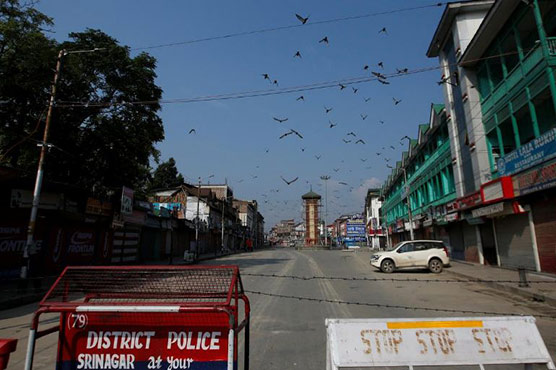Amnesty signals danger of unrest in region as India isolates Kashmir

It said the move could "cause unrest and widen scale [of] protests" in the disputed region.
SRI NAGAR (Dunya News) – Amnesty International, a global rights group, has cautioned India that its decision to amend the status of the Jammu and Kashmir would pave way for an increase in violence.
In a statement, Amnesty International asserted that "the unilateral decision" made by India without consulting stakeholders "amidst a clampdown on civil liberties and communications blackout is likely to increase the risk of further human rights violations and inflame tensions".
It said the move could “cause unrest and widen scale [of] protests” in the disputed region.
“What J&K (Jammu and Kashmir) has been witnessing over the last few days — the additional deployment of thousands of security forces, a blanket blockade of telephone and internet services, restrictions on peaceful assembly — has already pushed the people of J&K to the edge,” said Aakar Patel, head of Amnesty International India.
Larger rallies are expected on Tuesday as Pakistan will hold a joint parliamentary session and Pakistan Army’s top military commanders meet to discuss the move.
In Muzaffarabad, 45 km (28 miles) from the two countries’ contested border, dozens of protesters held black flags and burnt car tires, chanting “Down with India”.
Pakistan’s foreign ministry said in a statement that the country would "exercise all possible options to counter the illegal steps".
Pakistan also summoned the Indian high commissioner to Islamabad to register the country’s "unequivocal rejection" of India’s decision.
One senior journalist accused Prime Minister Narendra Modi’s government of humiliating residents of the divided Himalayan region while others warned that heavy-handedness risked triggering fresh unrest.
The government said the clampdown on telecommunications and media services, which began late on Sunday night and was still in effect almost 24 hours later, was needed to curb any potential violence.
Kashmiris, however, complained that the attempt by Modi’s government to control the flow of information had made it difficult for them to find out what was happening in the state, let alone air their views.
The constitutional change announced on Monday withdraws special rights conferred on residents of the state, including a provision that prevents outsiders buying property there. It also means that college places and state government jobs may no longer be reserved for permanent residents.
Mobile and internet services have previously been cut off in Kashmir at times of turmoil, but this time the government also blacked out landlines and cable television networks.
A top government official, who declined to be identified, told reporters in New Delhi the restrictions were precautionary and that life was expected to return to normal fairly soon.
But activists and editors warned there is a danger that such an attack on civil liberties will further alienate people in the state and increase the risk of further human rights violations.
In some parts of the state, authorities invoked a law that allows them to ban gatherings of more than four people, and some local political leaders were put under house arrest.
The government had already moved tens of thousands of additional forces to Jammu and Kashmir, already one of the world’s most militarized regions.
“Already under house arrest and not allowed to have visitors either. Not sure how long I’ll be able to communicate,” said Mehbooba Mufti, the most recent chief minister.
Some historians and senior Indian journalists were also highly critical.
“A straight question: what do you think of shutting down an entire state and detaining former chief ministers before taking a fateful decision that affects that state and its peoples?” asked prominent historian and columnist Ramachandra Guha.
Journalists working from the summer capital Srinagar and other parts of Kashmir struggled to get information out.
“Other than blocking journalists’ access, the government has humiliated the people of Kashmir by shutting down their entire state,” said Sagarika Ghose, an author and the consulting editor of the Times of India newspaper.
India’s decision is likely to increase tensions with Pakistan, which demands that India give the Kashmiri people the right to self-determination.
In July, Trump said Modi had asked him if he would like to be a mediator on Kashmir, but India, which has been staunch in its position that the issue can only be resolved bilaterally, denied that Modi sought mediation.
Tens of thousands of people in Indian-controlled Kashmir have died since an armed revolt erupted against Indian rule in 1989.
With input from Reuters

